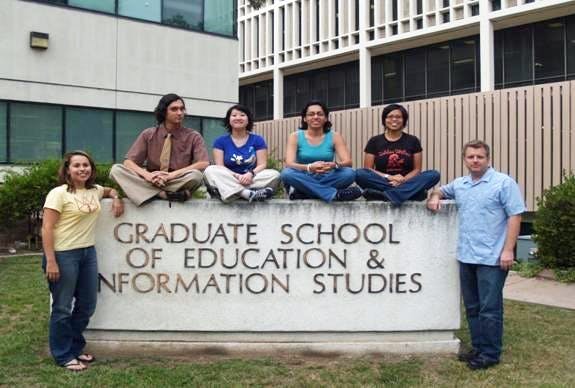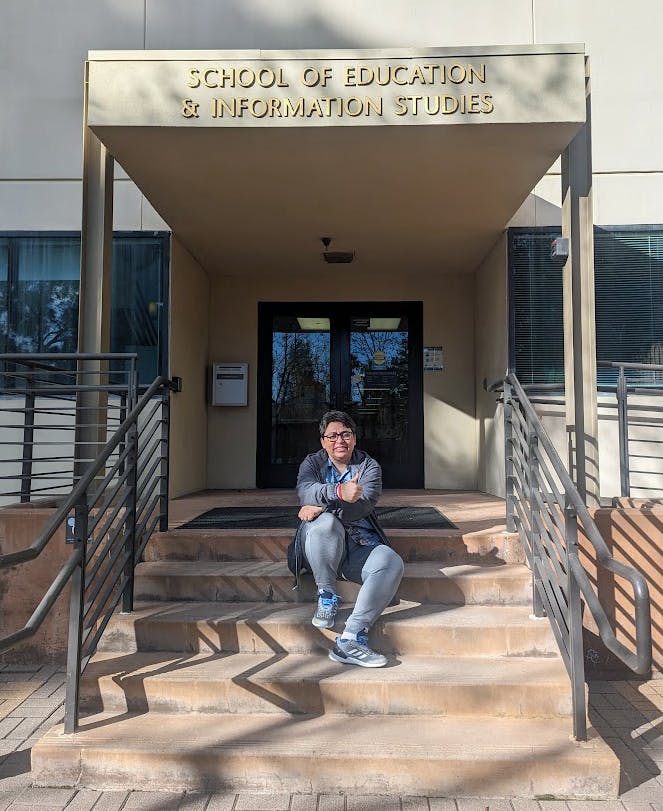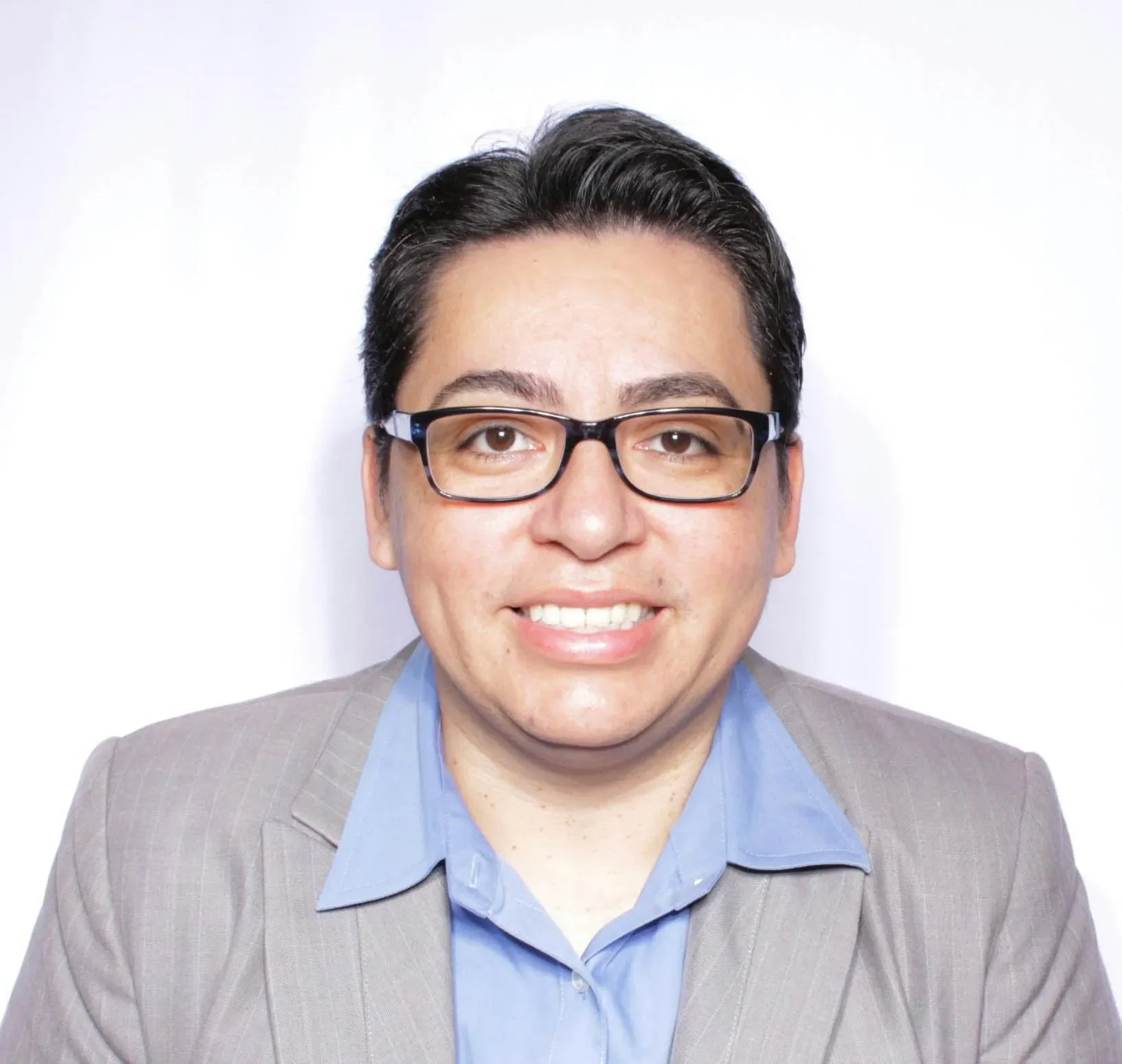Associate dean of library services at the University of Missouri-Kansas City oversees UMKC’s Miller Nichols Library and Health Sciences Library.
As a research librarian, Brenda Linares (’07, MLIS) has had a unique career that demonstrates the limitless versatility of a UCLA degree in Information Studies. While pursuing her undergraduate degree in finance at CSU Northridge, she was first introduced to librarianship as a student worker. Later, while earning her MLIS at UCLA, she worked in the Hugh & Hazel Darling Law Library and as a research assistant in the Louise M. Darling Biomedical Science Library
Linares currently serves as the associate dean of library services at the University of Missouri-Kansas City, overseeing the university’s Miller Nichols Library Services and Resources and its Health Sciences Library. In this role, which she assumed in 2022, Linares provides leadership and oversight on the collections, teaching, learning, and research mission of the libraries in support of UMKC curriculum and research.
Linares has a wide range of library experience, including the National Library of Medicine, the Louis Calder Memorial Library at the University of Miami Miller School of Medicine, the Health Sciences Library at the University of North Carolina at Chapel Hill, and as the School of Nursing liaison and health sciences librarian at the A.R. Dykes Library at the University of Kansas Medical Center in Kansas City, Kansas.
Upon earning her Master of Library and Information Science at UCLA, Linares participated in the National Library of Medicine Associate Fellowship program for early career health sciences librarians from 2007-09. She earned her MBA at North Carolina State University in 2017 and was awarded the Network of the National Library of Medicine Emerging Leader Award in 2022. Linares has received grants for outreach projects to promote patient and consumer health education resources and has held key leadership roles in the Medical Library Association (MLA), leading collaborations in support of open educational resources. She is currently the president-elect of MLA and will assume leadership of the organization in May as its 2024-25 president.
Linares has a professional passion for working with diverse populations and promoting health literacy and consumer health education. She served as co-principal investigator on a grant with JUNTOS – Center for Advancing Latino Health, an outreach program at the University of Kansas Medical Center, to promote credible health information by partnering with Spanish-speaking professionals to record Spanish podcasts on health topics relevant to the Latinx community. The funding came from the NIH All of US Research Program.
Linares shared her journey with The Latest, through her divergent paths of librarianship, highlighting the value of mentorship that she has benefitted from and continues to pay forward with her own expertise.
How did you choose UCLA for your MLIS and how did it prepare you for your current role?
Brenda Linares: I’m a Valley Girl, with my undergraduate degree from Cal State Northridge in finance. I worked in libraries as an undergraduate [as a] work study. I enjoyed working in the library and helping people out.
I graduated and found a job with the U.S. Treasury as a national bank examiner. We were auditors who traveled to banks, but you tell people what they’re doing wrong. They don’t like seeing you, you’re not welcome. It just was not fulfilling because I like helping people.
I had stayed in touch with Dr. Karin Duran, my supervisor in the [CSU Northridge] library. I was chatting with her and said, “I’m ready to change careers.” She said, “Well, have you thought about library school and getting your masters? I think you would be a great librarian, you’re very detail oriented.”
She said that we have great programs in Southern California and UCLA was one of them. I found out there was an information session at UCLA later that summer. The program and the classes seemed manageable and interesting, and I loved that it was local. In the fall, I took the GRE and later that year, I applied for the program. The following year, I applied for the ALA Spectrum Scholarship that helps with paying for the master’s in library science to recruit racially and ethnically diverse librarians into the profession. I got into UCLA and found out I got the ALA Spectrum Scholarship. It felt like everything was fitting together and I started that fall.
My first advisor was Professor Ethelene Whitmire; when she left for another opportunity in another university, my advisor the last year [was] Professor [Clara] Chu. Both were great mentors and positive influences in my professional endeavors. When it comes to classmates, I am still in touch with many of my classmates via social media. The ones that come to mind that we interact [with] more often are Candace Mack, she is really involved in LAPL; Melanee Vicedo, she’s at USC; Isabelle Ramos is a liaison librarian at Southwestern College. Dalena Hunter is another classmate, [she] is a librarian at UCLA’s Ralph J. Bunche Center for African American Studies; and Will Breitbach is dean of Library Services & Educational Technology at Shasta College. All of us met the first day of orientation and we have stayed in touch and see each other at ALA.
I really liked [what] the program offered: information literacy, collection development, and cataloging. I also enjoyed the information-seeking behavior class. I teach a version of this class as an adjunct instructor at the library school at Emporia State University. I wanted to take many different classes because I knew that as a librarian, I might be doing a little bit of everything when I got a job.
I always tell students if they are not sure what path to take, to talk to librarians and learn about what they do. I got a part-time job at the UCLA Law Library. I was not going to pursue a law degree, but my work there was useful. During my time in library school, I also worked a couple of hours at the Charles E. Young Research Library. I knew they had a program where you could do a couple of hours in the graduate library reference desk. I said, “Let me do that. I can do a couple of hours on the weekend to get exposed to answering reference questions.”
During my last quarter, the health science library had a program where they hired two research assistants. I liked that you would get exposed to doing reference, but also instruction, because I hadn’t had that yet. I was one of two students they selected, and I really enjoyed it. I liked that we were helping patrons [with] health questions. I had physicians coming to the reference desk. Whatever we were giving these healthcare providers was making a difference in patients’ lives or in the community, and that was fulfilling.
As I talked to the librarians working there, many of them didn’t have a background in the health sciences. They learned a lot [about] what they did, working in the library or being trained. I liked that opportunity and thought, “I can definitely learn a lot doing that – I can be a health sciences librarian.”

Along with several UCLA IS classmates, Brenda Linares (’07, MLIS; third from right) served on the 2006-2007 executive board of the UCLA student chapter of the American Library Association. L-R: Isabelle Ramos, Greg Horn, Candice Mack, Brenda Linares, Melanee Delgado-Vicedo, and Will Breitbach. Courtesy of Brenda Linares
What are some of the unique challenges to librarianship in support of the medical and health fields?
Linares: We have gone through so many challenges. Right now, what comes to mind is AI. The challenge for librarians is to be aware of those resources and have conversations with faculty to understand that students will use those tools – you cannot tell them not to use them. If we have a good relationship with faculty, finding ways of working together and knowing that those tools are here to stay, we can incorporate that into the classroom, collaborating with the faculty, or the information literacy classes for [students].
Being proactive is particularly important in our profession. We have seen it through the years. We had the card catalog and then we went online thinking, “That’s changing how we do things.” During COVID, we had to do a lot of our services virtually, so we had to take advantage of the tools available and reinvent how we did consultations and sessions. I did a lot of Zoom sessions as a librarian. We were threatened by Google, and here we still are. So, AI is one of those things that is important to be proactive and learn more about. It is changing so quickly that you need to be moving along with that change.
The other thing that is a challenge to librarians is what is happening in the country when it comes to [how] politics [affected] access to diverse resources and conversations of inclusion. Being an academic and in the health sciences, [I thought before] that we were protected in that, but nowadays, because a lot of funding to universities – which includes libraries – comes from state government, politicians are realizing, “[We] can have control of what they’re teaching in those institutions, and we can impose some of the policies we want to impose on our constituents.”
Another challenge is how we incorporate DEI into what we do with faculty, the students, or even in our own libraries, when it comes to recruitment and retention. It is really hard nowadays to post a job, [saying] you want a diverse candidate or [that DEI] is one of the things they want the candidate to be involved in. Places like California [are] more diverse and more inclusive. We live in the Midwest, with a lot of restrictions in the way we can and cannot do things when it comes to recruitment and the wording that we can use. That is a challenge to when it comes to recruiting diverse librarians into our profession, into our libraries, because people don’t want to move to the Midwest if they can’t be themselves.
We must continue doing what we do best and know our profession and the role we play is important [for] accessibility in education and information. COVID showed us there is a lot of misinformation. It was interesting to go through that as a medical librarian, going into the community [with] resources to urge people to take the vaccine or participate in clinical trials. We as a profession just need to not let these barriers that are coming our way, stop what we do.
How did the JUNTOS program address misinformation about the pandemic, particularly for groups that did not necessarily have the best access to accurate information?
Linares: KU Med had an organization, JUNTOS – Center for Advancing Latino Health, within the medical campus that wanted to [have] more outreach to the Latinx community in the Kansas area, especially rural areas, and now, they are doing a lot more in the in the city itself. I have had experience with the National Library of Medicine, applying for grants and doing outreach in my other jobs. I had a connection with the KU Med director and because I knew the regional directors for NLM in our region, I knew the process and we were able to apply for the grant.
This happened in 2019, right before the COVID-19 pandemic. Our plan was to get funding for recording equipment to be able to reach out to the community via Spanish podcasts. The project idea was to create a podcast on essential health topics relevant to the Latinx community. The plan was to have the podcast be recorded in Spanish and include Spanish Supplementary consumer health information from credible resources such as MedlinePlus en Espanol.
We got the grant, and we were planning on doing all that in late 2019 [or] early 2020. And then the pandemic happened, so we ended up switching some of the focus to what was relevant during COVID: distancing yourself, clinical trials, because we wanted to recruit more Latinos into that; taking the vaccine; and how to stay at home [while] exercising and staying healthy. Instead of creating a quiet space in their offices and getting people to record podcasts, we ended having to do it virtually.
We wanted to reach the Latinx community, and we had access to Spanish speaking healthcare providers, so we knew this was a great opportunity for them to hear directly from people [in] their own community. Nothing had to be translated. They heard them explain things and could relate to those healthcare providers because they were from the same background. And then, as a librarian, I would provide complementary resources in Spanish for that topic. If it was something about diabetes, they had an expert talk about diabetes in Spanish, maybe talk about some myths about diabetes, how it affects the Latinx community. In addition to that, I would share some of the consumer health resources available to complement that information, so they can look at credible resources, not just Googling something, but more that is credible, such as MedlinePlus.
We were [targeting] the Kansas area Latinx community, but the United States is full of Latinx people, so we decided to also promote it to other [areas]. It was great to see how people were receptive to that. We still promote the program; here is the link to [the podcast on] Juntos Radio. I write about this project in Chapter 7 of the recently published book, “Health Literacy and Libraries.”

Brenda Linares (’07, MLIS; pictured on a recent visit to UCLA in early 2024) will assume the presidency of the Medical Library Association in May. Courtesy of Brenda Linares
What do you look forward to achieving as president of the Medical Library Association?
Linares: It was great to be selected. One of the things I am hoping to do is focus more on DEI when it comes to the national organization. Chapters around the state have their own DEI committees, and the main organization of MLA has its own DEI [committee], but we are noticing there is not that much communication with the chapters and the main MLA DEI committee, so I’m hoping that we can do more of that in the coming year.
Recruitment is an important thing when it comes to recruiting more health science librarians of color. A lot of people get intimidated because they think you must have specific training and specialized skills. It is specialized, but you do a lot of training on your own where you work, and a lot of professional development [happens] with [professional] organizations. I’d like to see more Black, Indigenous, and other people of color (BIPOC) know that [they] can be a health sciences librarian.
